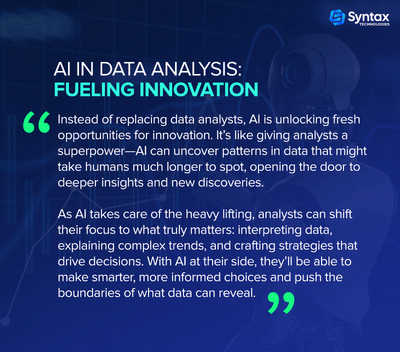If you’re working in data analytics (or thinking about it), you’ve probably heard people asking if AI is coming for your job. It seems every week there’s a new headline about how ChatGPT, machine learning, or fancy automation tools are changing the world of data. Is it all bad news for data analysts? The answer is perhaps far more complex.

While artificial intelligence is revolutionizing many aspects of data analytics, it is not eliminating the need for skilled data analysts. Instead, AI is pushing the profession to evolve—shifting the focus from repetitive tasks to deeper analytical thinking, business insight, and storytelling with data.
AI: An Enhancer, Not a Replacement
Think of AI as a super-powered assistant rather than a replacement. While it’s true that AI can handle many data-related tasks—like data cleaning, running predictive models, and even generating reports—it still requires human expertise to provide context, interpret the results, and make decisions based on business needs.
AI can process vast amounts of data at lightning speed, but it lacks the creativity, intuition, and real-world understanding that a human brings. For example, AI might flag a pattern in the data, but it��’s up to the data analyst to determine whether that pattern is meaningful in a specific business context.
How AI is Changing the Data Analyst Role
AI is transforming the role of data analysts by automating repetitive tasks and enhancing their work. Here are a few key ways AI is helping analysts:
- Data Cleaning: AI automatically detects and corrects inconsistencies in datasets, saving analysts time on data wrangling.
- Automating Reports: AI generates basic reports, freeing up analysts to focus on more valuable tasks like creating dashboards and providing insights.
- Predictive Models: AI helps build models, but analysts are needed to validate and align predictions with business goals.
- Advanced Data Visualizations: AI suggests the best visualizations for data, helping analysts present insights clearly.
- Data Anomaly Detection: AI flags unusual patterns in data, allowing analysts to address issues like fraud or system failures quickly.
- Automated Decision Support: AI provides recommendations based on data, helping analysts make faster, data-driven decisions.
- Real-Time Analytics: AI enables analysts to work with real-time data, improving responsiveness and decision-making.
Why AI Still Needs the Human Touch
AI is fast, but it isn’t wise. It doesn’t understand company culture, market context, or why that one drop in sales isn’t actually a crisis. It can make mistakes—especially if it’s trained on biased or incomplete data.
Enter the data analyst. A great analyst knows when to question the numbers, spot missing context, and communicate findings in a way everyone understands. As long as businesses need to make sense of information, they’ll need smart humans in the loop.
Articles you may like:
“Is Data Analytics still worth it?”
“Will ChatGPT Take Data Analysis Jobs (The TRUTH)”
Adapting: Making the Most of AI Tools
The key to thriving as a data analyst in an AI-powered world is adaptability. Those who learn to use AI-driven tools can explore datasets more deeply, complete tasks more efficiently, and uncover insights faster.
Instead of spending hours on repetitive tasks like data cleaning or basic reporting, analysts now have the capacity to devote more time to meaningful analysis, drawing conclusions that influence business strategy and add real value.
By staying proactive and building proficiency with the latest analytics technologies, analysts can enhance their productivity and become even more crucial to their organizations.
Conclusion: AI is Here to Help, Not Harm
In conclusion, AI is not negatively affecting the data analyst role. Instead, it’s helping analysts work more efficiently and focus on higher-value tasks. By automating time-consuming processes, AI frees up analysts to be more creative, strategic, and impactful. The key for data analysts is to adapt and learn how to use these tools effectively, so they can continue to provide value in an increasingly AI-driven world.
If you’re looking to advance your skills and stay ahead in the evolving world of data analysis, consider enrolling in the Data Analytics course by Syntax Technologies. Gain hands-on experience and learn how to leverage AI and other advanced tools to boost your career.

